Want to learn faster?
Make more mistakes!
This counterintuitive advice is from Adam Grant, in Human Potential, one of the keys to developing character: being comfortable with discomfort.
When I started in radio sales, I hated making cold calls. Calling on customers who didn’t know who are radio station was, or who I was, felt like walking into a board waiting to be slammed in my face!!
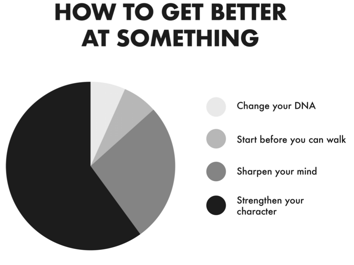 Little did I know this obstacle would make me a better sales manager, a general manager, and eventually lead to being a radio station owner.
Little did I know this obstacle would make me a better sales manager, a general manager, and eventually lead to being a radio station owner.
Success doesn’t come in a pretty package with a ribbon tied around it. The greater your ability to be uncomfortable, the higher your ability to grow and succeed.
Embrace Awkwardness
Developing character skills requires 3 kinds of courage:
- Embrace the unbearable awkwardness of Learning.
- Build the capacity to absorb and adapt.
- Find the sweet spot between flawed and flawless.
Two polyglots, people able to speak or write several languages, share how, after believing they couldn’t learn different languages, they discovered, that once they began speaking the language, and making mistakes, their language skills blossomed.
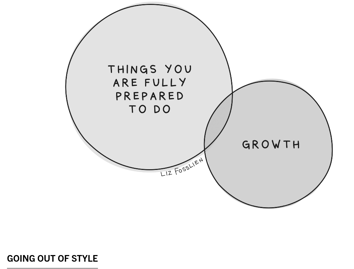 Comedian Steve Martin became famous only after he began writing jokes (he hated writing!) first for others then for himself.
Comedian Steve Martin became famous only after he began writing jokes (he hated writing!) first for others then for himself.
Grant shares, “Becoming a creature of discomfort can unlock hidden potential in many different types of learning. Summoning the nerve to face discomfort is a character skill—an especially important form of determination. It takes three kinds of courage: to abandon your tried-and-true methods, to put yourself in the ring before you feel ready, and to make more mistakes than others make attempts. The best way to accelerate growth is to embrace, seek, and amplify discomfort.”
“If you’re comfortable, you’re probably doing it wrong.” ~ Ted Lasso
Do you have a particular style of learning that suits you? Maybe you’ve heard each of us has a style we learn better at. Maybe it’s visual, auditory, or kinetic?
Grant shares that learning styles are a myth. In controlled experiments with specific lessons and longitudinal studies for a semester, students and adults didn’t do any better on tests when their teachers or study habits aligned with their abilities or preferences.
“There is no adequate evidence base to justify incorporating learning styles assessments into general educational practice,” the researchers conclude.
The way you like to learn is what makes you comfortable, but it isn’t necessarily how you learn best.
Sometimes you learn better in the mode that makes you the most uncomfortable because you must work harder at it.
This picture by Liz Fosslien shows how growth occurs.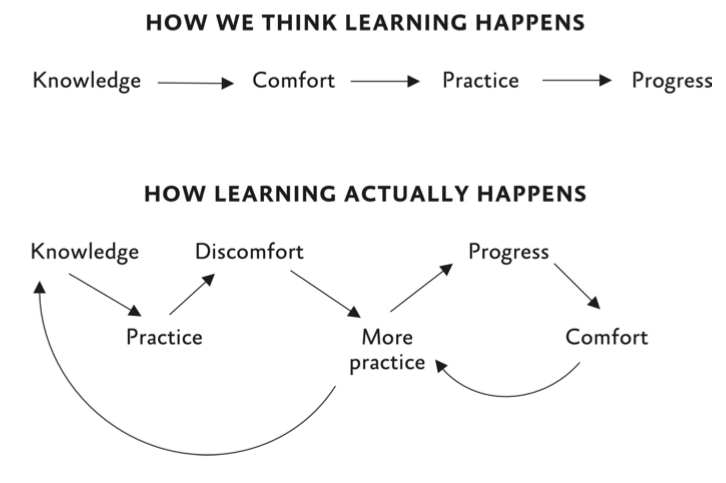
Make More Mistakes
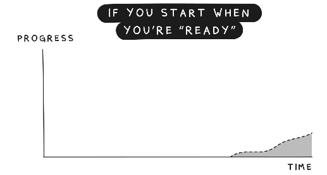 When I started selling radio, I didn’t know it, but all my failures helped me improve and get better at it. You need Einstein’s attitude, “I haven’t failed 1000x, I’ve simply discovered 1000 ways it will not work. I’m that much closer to discovering what will work!”
When I started selling radio, I didn’t know it, but all my failures helped me improve and get better at it. You need Einstein’s attitude, “I haven’t failed 1000x, I’ve simply discovered 1000 ways it will not work. I’m that much closer to discovering what will work!”
Is it time to reconsider your training methods or your coaching techniques?
Learning comes from making mistakes, and not being ashamed, or being admonished.
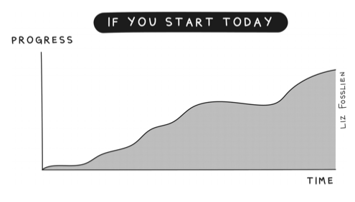 You really should encourage mistakes from those you train. The faster they learn what’s wrong the sooner they will start doing what’s right.
You really should encourage mistakes from those you train. The faster they learn what’s wrong the sooner they will start doing what’s right.
How Learning Works
Comfort in learning is a paradox.
You can’t become truly comfortable with a skill until you’ve practiced it enough to master it.
But practicing it before you master it is uncomfortable, so you often avoid it.
Accelerating learning requires a second form of courage: being brave enough to use your knowledge as you acquire it.
“Your goal is to feel awkward and uncomfortable . . . it’s a sign the exercise is working.”
Benny Lewis, one of the polyglots in Hidden Potential, sets a goal when learning a new language to make 200 mistakes a day. He measures his progress by the number of errors he makes. “The more mistakes you make, the faster you will improve and the less they will bother you,” he observes.
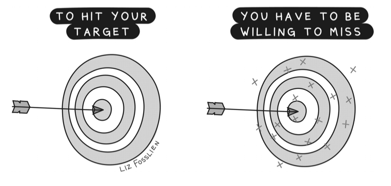 “The best cure to feeling uncomfortable about making mistakes is to make more mistakes.”
“The best cure to feeling uncomfortable about making mistakes is to make more mistakes.”
Psychologists call that cycle learned industriousness.
When you get praised for your efforts, the feeling of effort itself starts to take on secondary reward properties.
Instead of having to push yourself to keep trying, you feel pulled toward it.
You don’t need to get comfortable before you can practice your skills. Your comfort grows as you practice your skills.
I’ll close with this 4-minute Ted Video from Adam Grant on building great teams, and how to be a humble narcissistic leader (1:52). Grant notes, “Excellence is not about believing you’re the best, it’s about always striving to bet better.”
To create an environment where everyone is inspired to give their best, contact Positioning Systems to schedule a free exploratory meeting.
Turn your team into a repeatable coaching and growth organization.
Growth demands Strategic Discipline.
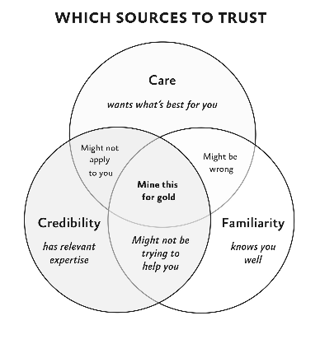 How well do you soak things up? Sea sponges are one of the earth’s oldest animals! If not for sponges, humans might not exist. In the next blog, absorb and adapt, we explore which sources you can trust, and how some athletes learn by coaching themselves to success.
How well do you soak things up? Sea sponges are one of the earth’s oldest animals! If not for sponges, humans might not exist. In the next blog, absorb and adapt, we explore which sources you can trust, and how some athletes learn by coaching themselves to success.
Building an enduring great organization requires disciplined people, disciplined thought, disciplined action, superior results, producing a distinctive impact on the world.
Discipline sustains momentum, over a long period of time, laying the foundations for lasting endurance.
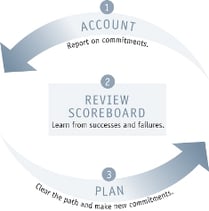 A winning habit starts with 3 Strategic Disciplines: Priority, Metrics, and Meeting Rhythms. Forecasting, accountability, individual, and team performance improve dramatically.
A winning habit starts with 3 Strategic Disciplines: Priority, Metrics, and Meeting Rhythms. Forecasting, accountability, individual, and team performance improve dramatically.
Meeting Rhythms achieve a disciplined focus on performance metrics to drive growth.
Let Positioning Systems help your business achieve these outcomes on the Four most Important Decisions your business faces:
|
DECISION |
RESULT/OUTCOME |
|
PEOPLE |
|
|
STRATEGY |
|
|
EXECUTION |
|
|
CASH |
|
Positioning Systems helps mid-sized ($5M - $500M+) businesses Scale-UP. We align your business to focus on Your One Thing! Contact dwick@positioningsystems.com to Scale Up your business! Take our Four Decisions Needs Assessment to discover how your business measures against other Scaled Up companies. We’ll contact you.
NEXT BLOG – Absorb & Adapt, Become a Human Sponge – Hidden Potential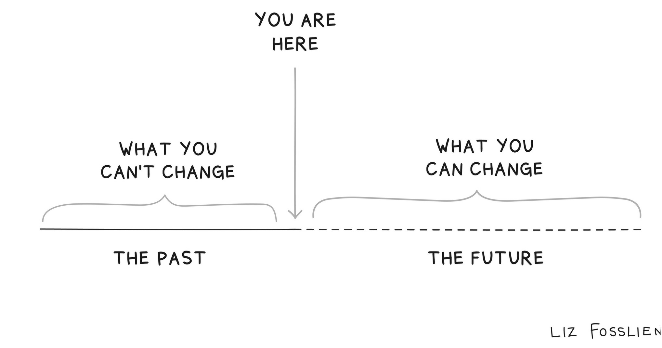






.jpeg?width=150&height=135&name=Hand%20with%20marker%20writing%20the%20question%20Whats%20Next_%20(1).jpeg)

